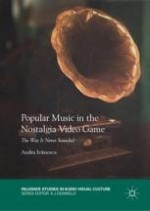
2019 | OriginalPaper | Chapter
1. The Ghosts of Popular Music Past and Video Games Future
Author : Andra Ivănescu
Published in: Popular Music in the Nostalgia Video Game
Publisher: Springer International Publishing
Activate our intelligent search to find suitable subject content or patents.
Select sections of text to find matching patents with Artificial Intelligence. powered by
Select sections of text to find additional relevant content using AI-assisted search. powered by